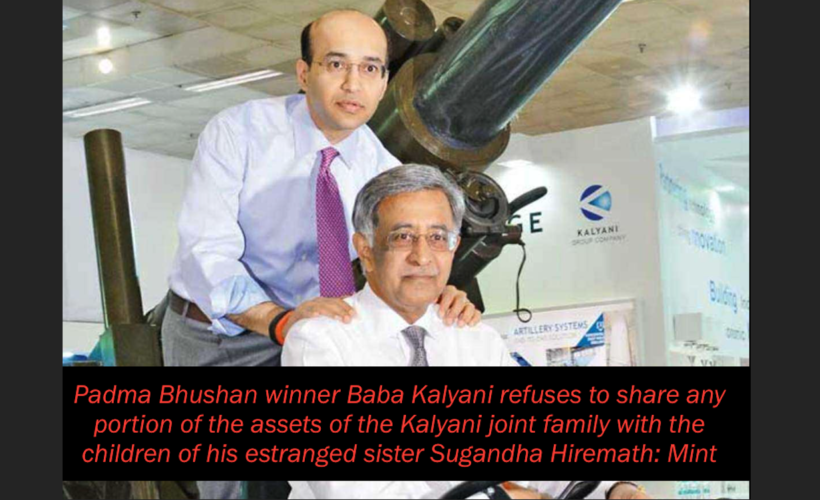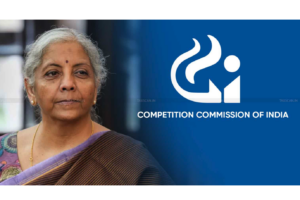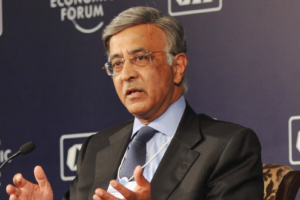
Baba Kalyani, who turned 75 this year and has a net worth of $4.1 billion contested a claim made by his nephew Sameer Hiremath and niece Pallavi Swadi as reported in the Economic Times. The duo has filed a suit demanding their share in the ancestral properties held in the Hindu Undivided Family (HUF) by the Kalyanis.
The stance taken by the wealthiest Maharashtrian and Forbes top 50 richest Indians has opened up discussion on gender parity in succession and inheritance under the HUF.
Baba Kalyani has filed an affidavit in Pune court stating that his sister’s children have no right over family wealth and are not coparceners in the HUF by virtue of being children of his sister.
The affidavit filed by Kalyani argues the position of daughters and her children when it comes to inheritance rights in her father’s Hindu Undivided Family.
Recently, the settlement announced by the 127-year-old Godrej Group, splitting the operations into two factions, could be taken as an example of arriving at an amicable settlement when it comes to family wealth. The Mint in it’s story mentioned that the group was split between two branches of the founding family, with Adi Godrej (82) and his brother Nadir (73) on one side and their cousins Jamshyd Godrej (75) and Smita Godrej Crishna (74) on the other. Adi Godrej and Nadir Godrej got control of all the listed entities in the group; Jamshyd Godrej and Smita Crishna have control of the unlisted entities.
Experts say this has always been a contentious topic. Dr. Asha Bajpai, (former) founder Dean and Professor of Law at the School of Law at Tata Institute of Social Sciences (TISS) was quoted in the Business World news portal stating that ever since its codification post-independence, Hindu personal law has been gradually maturing and evolving with changing times covering various aspects of marriage, succession, inheritance, adoption, maintenance, etc.
“The amendment of the Hindu Succession Act in 2005, which gave daughters the right to demand partition of property like their brothers, and made them equal coparceners in property owned by a HUF was a significant step towards improvement and ensuring gender justice within Hindu personal laws. In effect, it meant that even a daughter could seek partition of the ancestral property like her brothers,” says Dr. Asha.
Elaborated further, Dr. Asha says a coparcenary comprises the eldest member and three generations of a family—a son, father, grandfather and great-grandfather. Earlier, only male members of a Hindu family could be coparceners; the amendment by the Supreme court in 2020 allowed women to be coparceners and this was a welcome change.
Dr. Asha, who has been involved in legislative reforms centering on women and children for more than two decades, says that despite constant changes, discrimination in property laws is still a problem. “When it comes to the rights of the daughter’s children in the property of the maternal HUF, they will be similar to that of her brother’s children.
Another legal expert practising for several decades said, “The spirit of the law is clear that, as the son’s children are entitled to rights in ancestral property so are the daughter’s children, therefore, in a maternal grandfather’s HUF, the grandchildren from the side of the daughter will have the same rights as the children from the side of the son.”
Last year, the Murugappa Group too decided to settle the differences with the family branch of the late M.V. Murugappan to maintain overall peace and harmony within the family as reported in The Hindu. Differences cropped up between the family branch of the late M.V. Murugappan (including Valli Arunachalam and Vellachi Murugappan) and the rest of the family members as Ms Valli Arunachalam sought a representation on Ambadi Investments, the holding company of the ₹74,220-crore Murugappa Group, post the demise of her father.With the country’s richest and Padma Bhushan award winner Baba Kalyani taking this stance, we still have a long way to go before we rule out any gender discrimination and patriarchal biases in Succession laws.



